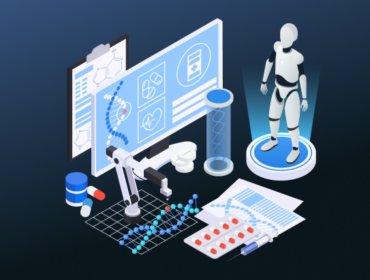Artificial intelligence software development is revolutionizing all industries from healthcare to manufacturing and agriculture. Simplified workflows, maximized process efficiency, 24/7 support with AI-powered chatbots – these are just a few luring promises that businesses hold on to on their way to implementing artificial neural networks.
But how to create artificial intelligence?
As a technology consulting company specializing in artificial intelligence development services, Unicsoft knows the ins and outs of this process. Having built dozens of AI-powered applications – from fraud detection to AI for skin cancer detection – we have helped businesses not only hop on the latest trends but also take the max of it in their business operations.
Read on as we share our expertise on AI app development and lay out the steps as to how to make an AI solution that will outperform your competitors and adapt to market changes.
What is artificial intelligence?
Artificial intelligence, or AI, is a technology that allows machines to mimic the cognitive and creative functionality of the human brain. An AI-enabled system can solve problems, train, and learn from previous experiences. Artificial intelligence software development helps spread AI-powered solutions across various industries.
AI uses several technologies, including machine learning, deep learning, computer vision, and natural language processing. Building an AI allows computers to see patterns, make predictions, and generate thoughtful responses. When speaking about AI, we usually refer to machine learning. It’s a subsection of AI that deals with self-learning algorithms.
The popularity of AI technologies is growing at a blistering pace. According to Statista, the global AI market will reach $126 billion by 2025. More and more companies in various business sectors actively adopt AI technologies to streamline workflows and improve services. The primary goal of AI and ML technologies is to create systems or programs that can self-train and learn.
How is AI used in mobile apps?
It isn’t just the AI market that will see growth in the upcoming years. The market for mobile applications is expanding rapidly, expected to bring in more than $613 billion in revenue by 2025. So it is not surprising that mobile apps and AI have intertwined. Let’s look at how AI app development improves mobile technologies.
Object and recognition
Artificial intelligence and object recognition technologies are combined to detect things, people, places, and other crucial components. AI app developers employ deep learning methods to train picture recognition algorithms. They prepare a data set to introduce items to an object recognition system. This technology simulates the way in which animals detect objects.
AI-enabled object recognition is used to improve disease detection too. For example, a user uploads a possible anomaly as a snapshot, and algorithms will quickly review and suggest a diagnosis. Here’s how it worked for Unicsoft client who needed an AI app for skin cancer detection, an AI app that scans moles to automate melanoma identification and prevention.
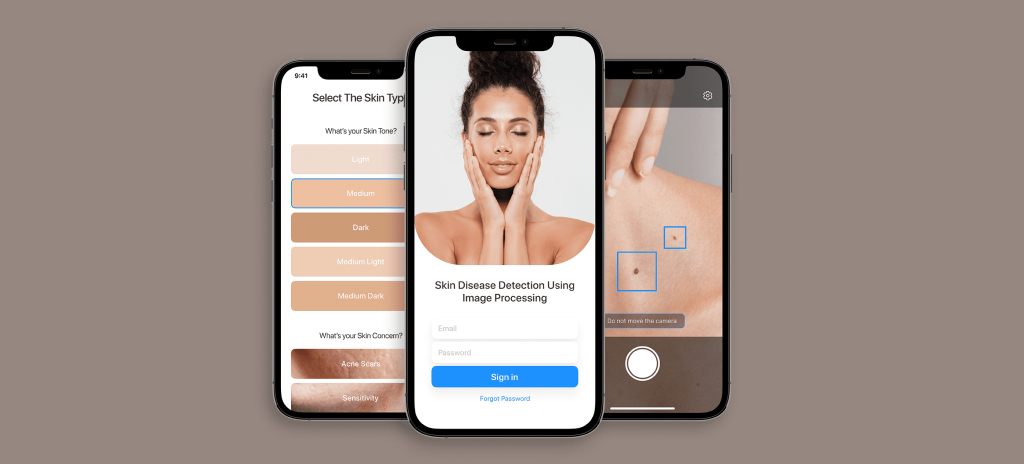
Besides objects, AI technologies also recognize and verify one’s identity. The app helps find human faces in a collection of pictures and determine if they belong to a specific individual. Face recognition-based iOS and Android apps typically serve security functions. Just think of Face ID to unblock your phone.
Text recognition
This technique finds and understands text within a visual medium. It is the process of automatically transforming text from photographs into a machine-readable text format so that it may be edited, found, and saved digitally.
Text recognition software is frequently used for translating, extracting text from photographs, reading printed text aloud to the visually impaired, and turning printed documents into editable versions of the text. AI and machine learning can classify and extract usable facts from vast amounts of text data.
Text recognition streamlines manual operations, boosts output, and increases access to previously inaccessible data, thus enhancing business, education, healthcare, and government productivity.
Searching for optimal routes in navigator
Mobile applications use automated reasoning to resolve current problems based on past events. An event from the past provides insights and solutions for the present. Navigation systems heavily rely on automated reasoning.
For example, Uber uses AI-enabled automated reasoning to offer the best routes to drivers. The app’s algorithms analyze data from each ride to generate the optimal routes. Users can check the distance to available drivers and the length of their trip, considering the time of day, based on the data gathered.
Natural Language Processing
Natural language processing (NLP) allows computer programs to read and understand human language from unstructured text and spoken words. NLP enables all speech-to-text tools, chatbots, optical character recognition software, and digital assistants like Siri and Alexa. NLP-powered voice search has also drastically improved the app experience.
NLP technology lets computers detect people’s emotions in their speeches with sentiment analysis. It helps to identify a person’s emotional background, see specific feelings, understand the intent behind the text, and determine connections. NLP and sentiment analysis applications allow businesses to optimize marketing and make targeted offers.
App personalization
According to McKinsey, 76% of consumers are more likely to purchase from brands that personalize their communication and products. And mobile shopping apps do a great job with it using AI to power their recommendation engines. Users’ interface is customized based on previous user behavior, such as location, past purchases, or usage habits. Contextual settings and adjustments make apps more attractive.
Advanced personalization provides a positive in-app experience. For example, My Starbucks Barista app replicates the ordering process within a Starbucks venue using AI and NLP. A personalization algorithm driven by AI facilitates ordering by examining speech and order history.
Benefits of AI mobile apps for business
According to Deloitte’s State of AI in the Enterprise report, the value business leaders gain from AI changes depending on the company’s maturity. Startups put process efficiency and cost reduction first, while seasoned AI users prioritize creating new products and services. Here are some crucial advantages of AI that any business benefits from.
Faster analysis of massive amounts of data
AI makes data analytics more manageable by automating and improving complex analytical operations. Otherwise, such operations would be labor- and time-intensive. They include data preparation, data visualization, and predictive modeling. AI facilitates user interaction with massive, complex datasets. It helps to get actionable insights from data much faster.
Better decision-making
Algorithms and AI models are the cornerstones of decision-making. They methodically extract helpful information from data, helping businesses prevent crises and predict behavior. They improve automation and save time and human resources for forecasting and prediction analysis.
Enhanced customer engagement
AI technology supports proactive and individualized customer engagement via self-service tools, updated apps, new user interfaces, dynamic interactive voice response, and chat.
Based on customers’ behavior and psychological characteristics, AI identifies and segments customers. Knowing the market demands and customer interests, businesses can create a customized message that is more likely to persuade and motivate them to make a purchase.
Increased customer satisfaction
Customers who use AI-powered predictive personalization feel that every brand, service, and product is created with them in mind. As a result, it helps offer customers relevant and valuable information. Companies that have integrated AI into their systems have strengthened client relationships and improved customer satisfaction.
Consider the success story of a Unicsoft client, who increased CTR x6 and reduced churn rate by 20%. Having delivered hyperpersonalization on a mobile engagement platform, we have contributed to the following business results:
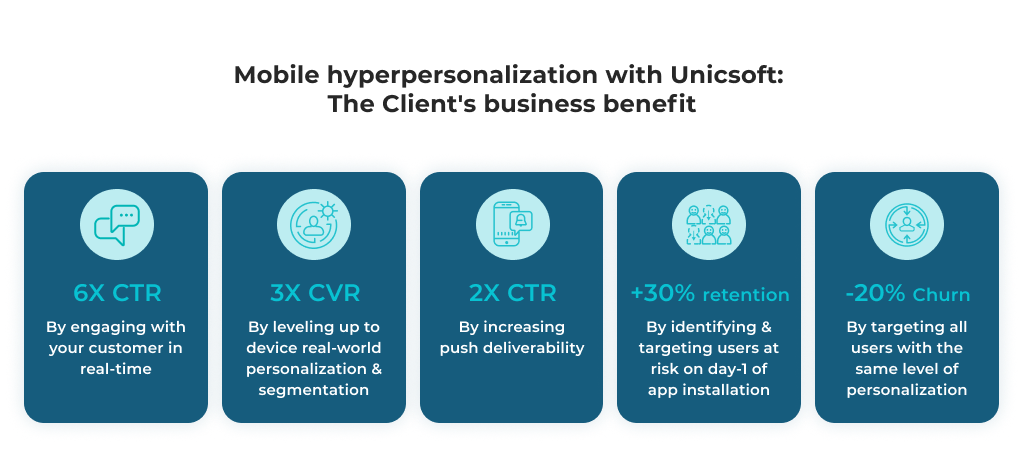
Less manual labor
AI excels at monotonous and tedious jobs that humans hate. AI solutions such as chatbots eliminate tedious, repetitive tasks and carry out various functions in sales, customer service, and other office roles. They expedite operations and processes while producing accurate results. AI helps to increase worker efficiency but also causes displacement of some workers whose tasks can be automated.
Lower operating costs
AI-based automation is essential for enterprises. Deployment of more precise and better suited to tackle specific jobs, AI technologies help lower expenses, increase productivity, save costs, boost accuracy, and improve scalability. By automating repetitive processes and operations, businesses save resources while allowing employees to concentrate on more strategic goals.
Data mining
Businesses use data mining in AI to develop fresh, cutting-edge business models. The main goal of data mining is to identify challenging patterns for people to find. It allows for producing trustworthy insights and making more informed decisions. Additionally, it aids in data filtering to remove unimportant data, making it simpler to concentrate on the most crucial data. Combined with AI, data mining goes deeper and reveals more insights facilitating corporate growth.
Preparing for AI development
It is essential to adequately prepare for AI development. Here are some crucial steps to kick off your AI project.
Step 1. Identifying a problem to solve with AI
How to build an AI system? Finding a problem that AI can address is the first step. Some businesses would integrate AI to automate a particular task and increase productivity, others would focus on boosting decision-making. Precisely identifying the issue and laying out the goals the AI system must attain is crucial.
Step 2. Gathering and preparing data for AI development
After the issue is identified, the next stage is to gather and prepare data for AI development. Some of the crucial actions in this process are listed below:
- Collecting data. First, gather relevant data from which the AI system can learn. This information can be presented as unstructured data (such as text, photos, or audio) or structured data (such as information from a database).
- Cleaning data. Eliminate any noise, errors, or inconsistencies in your dataset. It calls for locating and fixing errors, removing duplicates, and standardizing the data format.
- Data reprocessing. After the data is cleaned, the next stage is to prepare it for AI development. In other words, you’ll have to look into feature extraction, normalization, or transformation.
- Data labeling. If the data is unstructured, it must be labeled to give the AI system the correct output. It entails activities like text classification or image annotation.
- Splitting data: Having cleaned and prepared the data, divide it into training, validation, and test sets. A test set evaluates the model’s performance, while a validation set trains the AI algorithm and refines the model’s hyperparameters.
Step 3. Selecting the best platforms and tools for your AI project
Your AI project success depends on your choice of platforms and technologies. Here are some of the crucial tools and software you should consider.
- Cloud platforms. Cloud platforms like AWS, Google Cloud, and Microsoft Azure offer various services and tools, making the creation, launch, and maintenance of AI applications simpler. Scalability, simplicity of usage, and affordability are the advantages of using cloud platforms for AI development.
- Frameworks and libraries. They offer pre-built tools and code to create AI models fast and effectively. Some of the well-known frameworks and libraries used to develop AI include Scikit-learn, PyTorch, and TensorFlow.
- Programming languages. Python and R are two of the more well-liked ones for AI development. Developers use Python for creating AI as it is easy to read, understand, and modify. R offers a variety of libraries and tools that simplify data analysis and visualization for AI and data science.
Suppose you’ve recognized the advantages of artificial intelligence and have an innovative idea for your business. In that case, you’ll need a vendor with the necessary skills, a robust portfolio, and excellent reviews on IT companies’ ranking websites. Check out top artificial intelligence companies in 2023 that may help you out, with Unicsoft leading the list.
How to create an artificial intelligence app
Even though each AI project is unique, there are some common steps to create an AI software product. So, how to develop artificial intelligence software? Having built dozens if not hundreds AI projects at Unicsoft, we suggest you start small with a prototype to test your ideas and raise more funding to support your ambitious goals.
- Clarify your AI business objectives
Examine the potential benefits of new AI technology for your company:
- Do they address any of your problems that you can’t handle in another way?
- What actual impact do they make?
- How will you measure the effectiveness of your AI systems against KPIs?
Many businesses fail in their AI endeavors because they let the fear of missing out waste their resources on expensive but ineffective AI projects. Think critically about why you want your AI software when it looks like everyone else is doing it.
- Evaluate available data
Having determined the reasonable business objectives, consider accessible data. Your choice of tech stack and the necessary skills depends on the state of your data.
Your company objectives and the data heavily influence the scope of your project and, consequently, the investment amount. So make sure the first two steps are done correctly: they explain the “why” behind your AI project.
- Choose the right stack
The appropriate tech stack should meet your project’s needs. Programming languages, development tools, testing tools, cloud services, and big data solutions are all included here. You can reduce your possibilities only after you know your project’s requirements. Your AI team should recommend you the stack options.
- Invest in IT infrastructure
Machine learning model training consumes a lot of computer power. You need to spend more on servers, storage, and networks to ensure AI does not interfere with your current business operations.
If your system still runs on a legacy architecture, you will need to upgrade it before beginning AI projects. Your company will scale up its existing technologies with cloud computing and data analytics infrastructure to make room for AI capabilities. Recruiting and assembling an AI team is simpler when the infrastructure is AI-ready.
- Build the AI team
The complete AI team comprises three roles: business, data analytics, and software engineering. Although the business and engineering team members may have collaborated before on non-AI projects, the data specialists are likely new to the group. As a result, the team must decide how to manage AI projects to cooperate as effectively as possible.
- Big data analytics
To create AI software, collect, store, process, label, and optimize your company’s data. You will need to set up the following structure with several data specialists transferring your data from raw to AI deployment, depending on the state of your data: data engineers, data scientists, data analysts, and machine learning engineers. Check out more examples of Big Data and AI in our blog.
- Deploy ML models into AI software development
During this stage, engineers use ML models to create AI software. AI projects have a significant level of risk. So adopting Agile into the software development cycle is preferable to manage risks at each phase. The AI team should strictly adhere to MLOps, which is a method for enhancing software quality through ongoing communication between operations and development. A team can use MLOps to integrate ML models into development.
- Software and ML models testing
Continuous testing benefits ML models in the same way that rigorous testing enhances software quality. Machine learning (ML) models require ongoing testing as they update autonomously with new data. If they are regularly monitored, datasets will stay healthy and remain unbiased.
Challenges of creating artificial intelligence
AI system development involves a unique set of challenges. Here are some typical obstacles you might encounter and solutions to them.
Overfitting
Overfitting is when a model performs well on training data but poorly on new data. Some methods for preventing overfitting include regularizations to penalize large weights, early training termination to stop the process before the model overfits, and data augmentation to produce additional training data.
Underfitting
Underfitting occurs when a model represents the complexity of the data inaccurately. Here are a few strategies to combat underfitting: increasing the model’s complexity by including more layers, feature engineering to gather more data and enhance the output, and hyperparameter adjustment to improve the model’s performance.
Lack of data
Lack of data is a frequent problem in the development of AI. To overcome the data shortage, you can try:
- data augmentation to create additional training data
- transfer learning to leverage existing data
- active learning to select the most informative data for labeling.
Choosing the wrong model or algorithm
Selecting an incorrect model or algorithm is the most common problem in AI development. Here are some strategies to address the issue:
- Try many models and methods to find the best solution for the issue.
- Keep updated with recent studies and innovations to find better models and algorithms.
- Consult with industry professionals to choose the most effective model or algorithm.
An experienced AI software development vendor will help you overcome these pitfalls and build an AI solution based on best practices and industry trends.
Best practices for developing accurate and efficient AI
Combining technological know-hows and best practices will help you create accurate and effective AI. Here are some practices we follow at Unicsoft that will make your AI app more precise.
Collecting qualitative data
For an AI system to be successful, high-quality data must be gathered. Here are some suggestions for collecting reliable data:
- Gather information that is pertinent to the issue at hand.
- Verify the accuracy, completeness, and error-freeness of the data.
- Gather information from various environments and sources to provide the AI system with flexibility.
Look at our AI & Big Data use cases that help businesses to stay profitable despite the crisis.
Choosing appropriate algorithms and models
The success of an AI system depends on selecting suitable models and algorithms. The following are some guidelines for choosing the right ones:
- Choose a classification, regression, or clustering approach according to your problem.
- Pick a model that suits the complexity and amount of your data.
- Adjust the hyperparameters to enhance the model’s functionality.
Regular evaluation of the AI model
Your AI model’s accuracy and effectiveness must be regularly evaluated and improved. Here’s what you can do:
- Test the AI model frequently to ensure it responds effectively to new data.
- Update the AI model with new information to keep it current.
- Create a feedback loop so users can comment on how well the AI system performs.
These best practices create an interpretable, precise, and effective AI system.
Unicsoft Experience
Unicsoft is an award-winning technology consulting company that offers end-to-end custom artificial intelligence software development services. We guide artificial intelligence projects to success at every stage, from prototype to MVP to full-fledged solution development and infrastructure integration.
If you’re still in two minds about the right solution, Unicsoft might also be your consulting partner helping you choose the right AI tech for your case scenario, plan out the software architecture, and offer you expert advise throughout the project.
Wondering about our process? Here’s how it goes in a nutshell:
- We collaborate closely with our clients to fully understand the project goals and translate them into specific milestones and an action plan.
- At the planning stage the Unicsoft specialists determine the sources to gather, arrange, and analyze data for modeling and collect it.
- Our data scientists go the extra mile to clean and label the collected data, while the team lays out the most crucial prediction features and training algorithms for your AI app.
- We evaluate the accuracy of your AI model version and estimate the future AI development roadmap.
- Once the AI model is deployed, we evaluate its effectiveness and establish benchmarks for future iterations. We regularly address data biases and remove noise to improve the model’s overall accuracy.
Unicsoft has developed Artificial Intelligence for skin cancer detection to automate the process of melanoma diagnosis. It is an iOS application that uses a camera to take in-depth pictures of the patient’s skin areas, sends them to a clinic for examination, and saves them in the database so that it is simple to compare the images taken at various visits to analyze the dynamics.
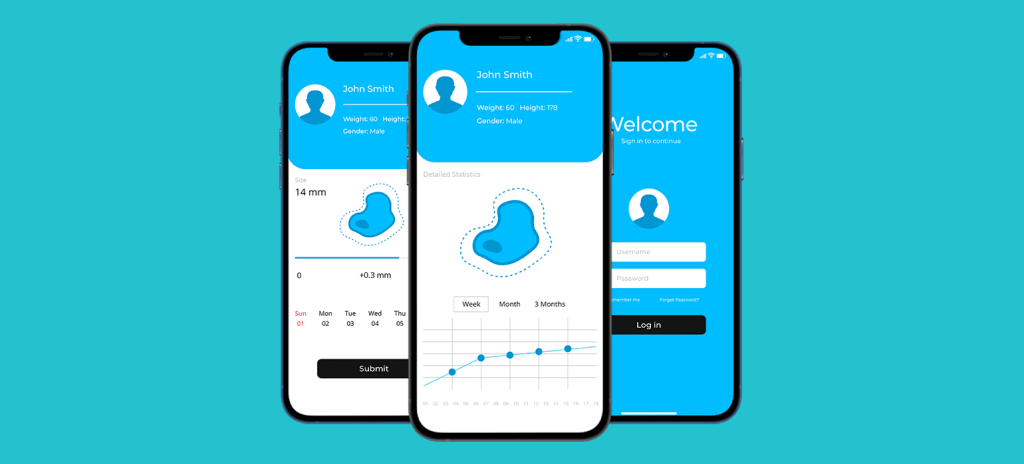
Accelerate your AI app development with Unicsoft
Developing an AI app is a multi-stage process requiring specialized knowledge of particular technologies. Understanding why you need an AI app and getting the correct data are the most significant issues you must identify before proceeding.
At Unicsoft, our specialists have proven experience in artificial intelligence development from scratch. We build end-to-end custom AI solutions to give you a competitive edge on the market. From prototype to MVP to full-fledged solution development and infrastructure integration, we’ll help you succeed at every stage.
Contact us to discuss the details of your AI-enabled project and get an estimate.
FAQs
How much does artificial intelligence cost?
Custom artificial intelligence can cost anywhere from $5,000 to $350,000. This is because it relies on several variables, including the rate of AI developers and other professionals, data collection and preprocessing, and infrastructure costs.
How long would it take to build an AI system?
Project timelines will depend on the complexity of the project and the available resources. The following are some factors impacting the duration of the AI project: time spent gathering data and processing it, the length of the AI models’ training, development, and testing time.
Can I create my own AI?
Yes, if you follow the instructions in this article, you can develop your AI system. However, you will need a technological background in machine learning, deep learning, and natural language processing to build an AI system. Unless you fancy programming yourself, consider partnering with an experienced AI software development services provider like Unicsoft.
How can Unicsoft help with AI application development?
Unicsoft uses a proven model development process that will guide your AI app to success. We define business requirements and analyze, collect, and prepare data for modeling. After that, our experts select features and evaluate the model’s performance. We project go-live estimation and continuously optimize the working model.




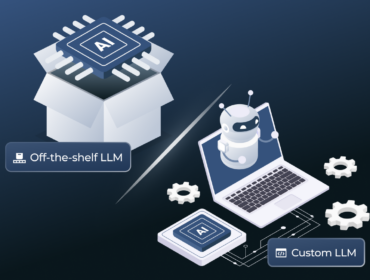
![How to Create an Artificial Intelligence App in 2023 What’s the EU Artificial Intelligence Act and How to Comply? [Webinar]](https://unicsoft.com/wp-content/uploads/2024/03/Cover_1140_v1.1-370x280.png)
